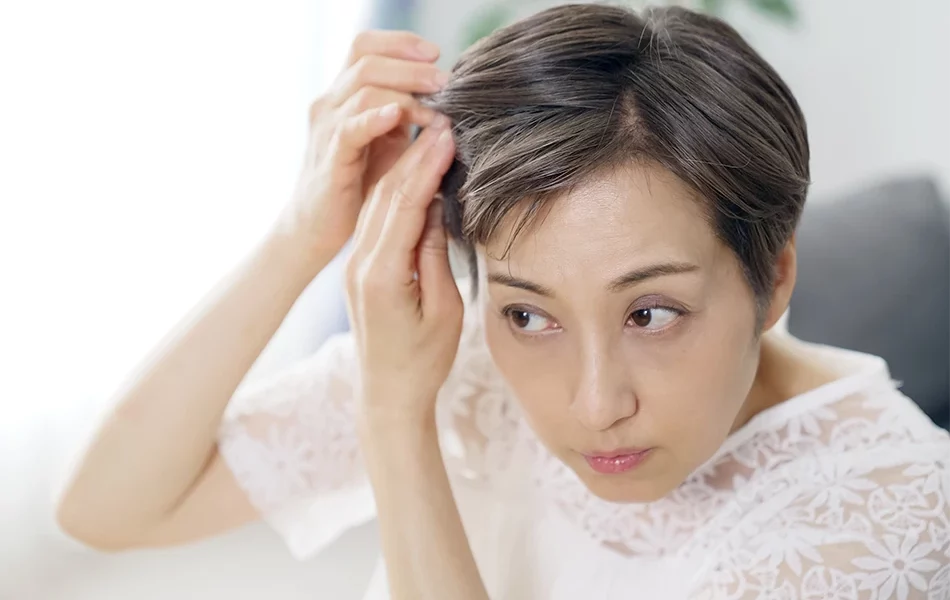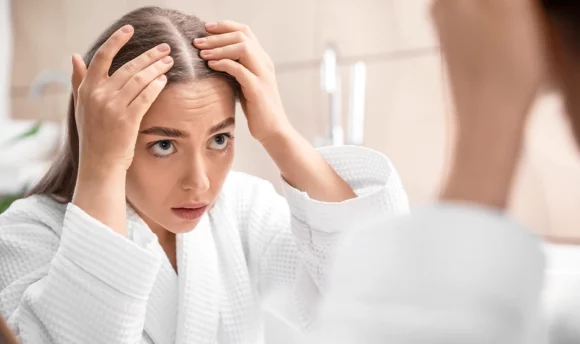Spironolactone for Hair Loss: Is This the Answer?
Spironolactone is an effective treatment for fluid buildup throughout the body. But can it work as a medication for female pattern hair loss?

It can be exhausting trying all the hair loss solutions that seem to pop up on the market, especially if you don’t see any results.
Although it is primarily used as a treatment for liver or kidney disease, heart failure, and high blood pressure, spironolactone is a medication that is now regularly prescribed for female pattern hair loss.
The drug has several benefits for promoting healthy hair, but will it work for you? Read on to find out whether spironolactone is effective for hair loss, how it is used, and some possible side effects.
Spironolactone for Hair Loss: Is It Effective?
Yes, spironolactone therapy is effective in combating female pattern hair loss by reducing the overproduction of male sex hormones that attack hair follicles. In a 2015 study, approximately 75% of participants noticed a significant improvement in their hair loss after taking the drug.
Another study found that spironolactone worked when combined with minoxidil, another medication often prescribed to treat hair loss.
The results of this research showed that the combination reduces shedding and promotes thicker and faster hair regrowth, therefore, working to combat the effects of alopecia.
What Is Spironolactone?
Also known by the brand name Aldactone, spironolactone is a Food and Drug Administration (FDA) approved medication that was originally developed as an aldosterone antagonist or diuretic.
It is typically used to treat high blood pressure, heart failure, liver disease, and kidney disease. However, medical professionals now also prescribe the drug for female pattern hair loss caused by androgenic alopecia.
This type of hair loss is caused by the overproduction of androgens such as dihydrotestosterone (DHT) in the body, which are male sex hormones.
How Much Spironolactone Should I Take for Hair Growth?
Depending on the severity of your hair loss, other medications you’re taking, and whether you have another health condition, the amount of spironolactone required will vary from person to person.
Research has shown that a dosage between 25–200 milligrams per day is effective in restoring hair.
However, doctors may advise you to start at the lower end of this range to minimize the drowsiness, nausea, and mood changes you may experience by starting at a higher dose. Only a licensed physician can tell you what your exact dosage should be.
Who Should Use Spironolactone for Hair Loss?
Women suffering from hormonal hair loss can benefit from the use of spironolactone, especially those who have already tried treatments such as minoxidil.
Although the medication treats female pattern hair loss, spironolactone isn’t effective for women suffering from hair fall for other reasons, such as vitamin deficiency, chemotherapy, or chronic stress.
The drug will also not be prescribed for men, as it works by reducing the presence of male sex hormones. This can cause unwanted side effects, such as the enlargement of breast tissue.
If you are pregnant or breastfeeding, you should not use a hormone-altering medication such as spironolactone. Consult your doctor if you have any other medical condition or are taking other hair loss medications, as this may affect the dosage prescribed by your doctor.
How Does Spironolactone Work for Hair Loss?
Spironolactone reduces the rate of hair loss in women by slowing the production of male sex hormones in the body. These hormones, including androgens such as dihydrotestosterone (DHT), stick to hair follicles on the scalp and cause them to shrink.
This prevents strands from growing and has been found to contribute to hair loss.
Taking anti-androgenetic medications, such as spironolactone, not only encourages increased hair growth on the scalp but also reduces excess hair on the face.
Known as hirsutism, this condition typically occurs in women with polycystic ovary syndrome (PCOS) who have sensitive androgen receptors. This puts them at a greater risk of hair loss due to the presence of androgens within their bodies.
Spironolactone is, therefore, also effective for treating PCOS-related hair thinning.
Benefits of Spironolactone for Hair Loss
Although it is not FDA-approved to treat hair loss, spironolactone has several advantages in terms of promoting healthy locks.
Here are the main benefits of taking the medication as a hair loss treatment:
#1 Reduces hair loss
Spironolactone works to reduce hair loss caused by androgenetic alopecia by blocking the action of male androgen hormones such as DHT and testosterone. Overproduction of these hormones can cause hair loss in women.
It also helps minimize hair loss caused by PCOS, as women with this condition typically have elevated levels of testosterone in their bodies.
#2 Promotes hair regrowth
As spironolactone combats the work of male androgen hormones within the body, it also helps to promote healthy hair regrowth for those with alopecia.
In a study conducted on a woman with female pattern hair loss, hair regrowth was documented for 12 months after taking a daily 200-milligram dose of spironolactone. At this point, the hair growth process has stopped, and no further improvement has been seen.
However, a topical minoxidil solution was then introduced, and regrowth began again, suggesting that a combination of the two medications is most effective for this purpose.
#3 May thicken hair
Taking spironolactone may help to strengthen strands that have become thin as a result of androgenic alopecia.
However, current research shows that the drug only works as a thickening agent when combined with minoxidil. The study also concludes that it is not as effective at increasing hair density as minoxidil combined with microneedling.
Side Effects of Spironolactone
As a drug often prescribed to treat hypertension, spironolactone can cause a significant drop in blood pressure. This can be dangerous for those who don’t have high blood pressure, leading to dizziness, blurred vision, fainting, nausea, and confusion.
You should, therefore, regularly check your blood pressure to prevent these symptoms.
One of the most serious potential side effects of spironolactone is high blood potassium levels (hyperkalemia). Though rare, hyperkalemia can be life-threatening and may cause paralysis, abnormal heartbeat, muscle fatigue, and weakness.
If you are experiencing any of these symptoms, it is important to seek professional help straight away.
Some of the common side effects of spironolactone include:
- Diarrhea
- Headaches
- Fatigue
- Weight gain
- Depression
- Irregular periods
- Breast tenderness
FAQs
To avoid falling asleep at your desk or the dinner table, it’s advised that you take spironolactone at night just before bed, as the drug might cause drowsiness.
Spironolactone is used to treat conditions that cause hair thinning, such as androgenetic alopecia and polycystic ovary syndrome (PCOS), so it may be effective in aiding thicker hair growth.
The length of time that spironolactone takes to work can vary from 6 months to 1 year, depending on factors including your age and the severity of your hair loss.
Although spironolactone isn’t FDA-approved as a hair loss treatment, it is generally a safe medication. However, it may not be safe for those who are pregnant, breastfeeding, or have another condition that should be monitored whilst taking the drug.
A Word From an MD
Although it is effective in treating hair loss and other conditions, it may take a while for you to see results on spironolactone.
However, if your hair loss hasn’t improved after 6 months, talk to your doctor. They may be able to increase your dose or prescribe an alternative medication to take instead of or in addition to spironolactone.
You should always talk to a doctor before taking a drug like spironolactone to make sure you are getting the right dose.
As a diuretic that causes the kidneys to eliminate excess fluid, you may become extremely dehydrated while taking this medicine, so be sure to increase your water intake.
If your hair loss is not hormone-related, spironolactone will not work for you. You should try to address the other possible underlying causes to help your hair grow back faster by eating a balanced diet, reducing stress levels, and building a good haircare routine.
For instance, use some oils to nourish your locks, such as argan, coconut, or castor.
Conclusion
Although it may take up to a year to work, spironolactone is an effective hair loss treatment for women with androgenic alopecia. Avoid it if you are male, pregnant, or breastfeeding, and consult your doctor if you are taking other medications.
Be sure to drink plenty of fluids and watch for symptoms of dehydration, low blood pressure, and high blood potassium levels. Always seek professional medical advice if you are concerned.

















































 Select your language:
Select your language: 








